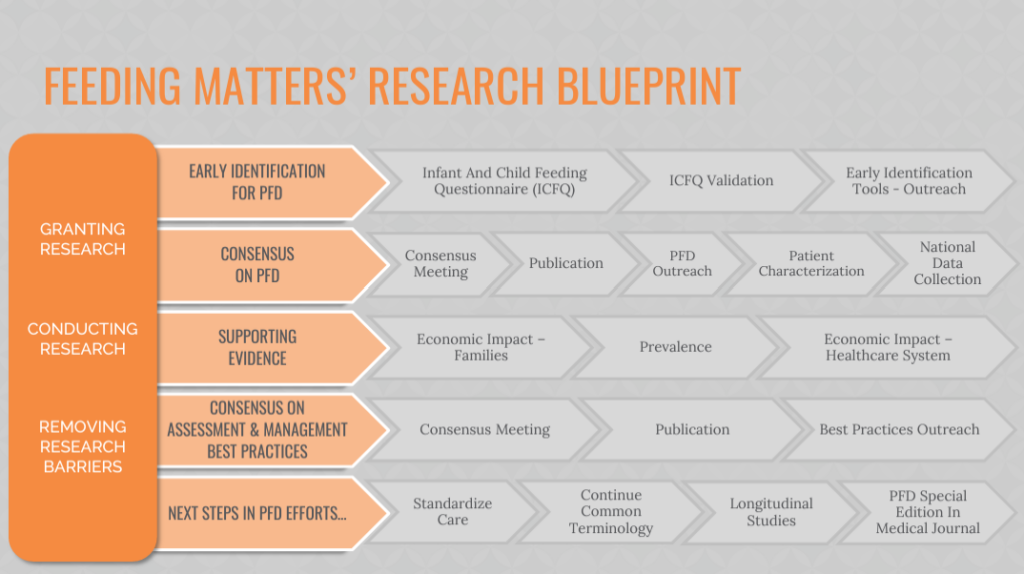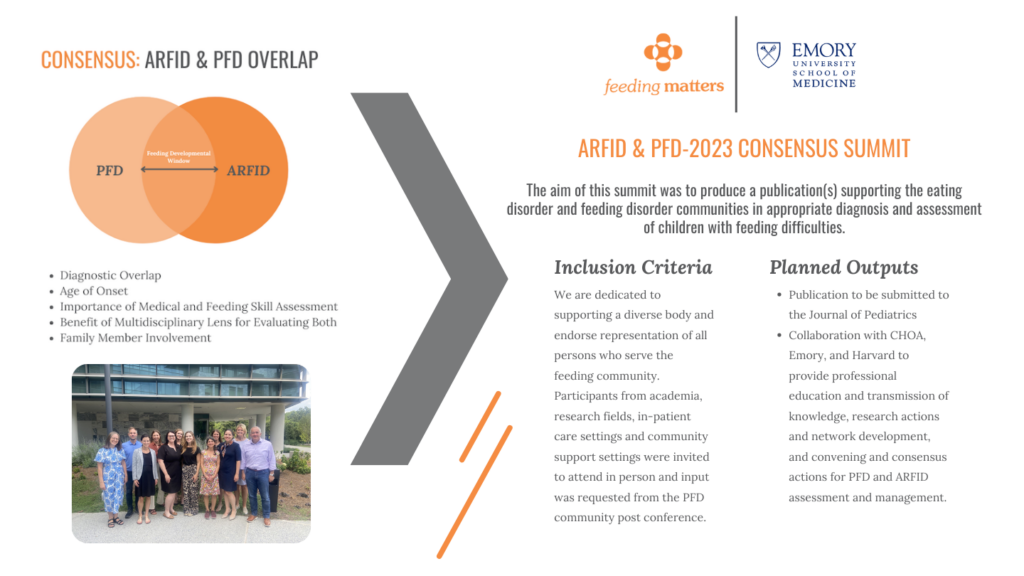Research Pillar
A lack of longitudinal, evidence-based data and the diverse nature of pediatric feeding disorder (PFD) have often been cited as barriers to understanding the individualized needs of children with PFD. Feeding Matters and the PFD Alliance strive to identify, fund, and facilitate research and clinical studies that address these issues and move the field from utilizing practice-based evidence to relying on evidence-based practice.

Click the image for larger view.
Share your Research Interests
Are you conducting research, starting a quality improvement project, or looking for research partners? Tell us about your projects, interests, and research updates. Your information helps direct our next steps in research.
Research Projects & Outputs
Family-Centered PFD Research Consortium
Feeding Matters has launched a family-centered program to inform research on pediatric feeding disorder (PFD) ensuring that as PFD research grows, we are always considering the family voice. The Feeding Matters Family-Centered PFD Research Consortium launch was partially funded through a Patient-Centered Outcomes Research Institute® (PCORI®) Eugene Washington PCORI Engagement Award (EACB-31710). Learn more.
Evidence-Based Practice
Evidence based-practice is the integration of clinical/practitioner expertise, external, internal evidence, and client, caregiver, and family unique perspective, values, and cultural beliefs. Learn more about making evidence-based decisions.
PFD Scoping Review
This scoping review by Estrem et al. examined 415 published studies on PFD between 2009 and 2019. The results of the review highlighted the designs and methods used in research on PFD, revealed critical gaps in knowledge generation and barriers to intervention replication, and set the stage for future studies. Read the study.
Citation: Estrem HH, Park J, Thoyre S, McComish C, McGlothen-Bell K. Mapping the Gaps: A Scoping Review of Research on Pediatric Feeding Disorder. Clinical nutrition ESPEN. 2022.
Provider Survey
To better understand the community treatment landscape for PFD in the United States and identify provider and treatment delivery characteristics, Feeding Matters collected primary data through a web-based survey targeting providers from all four PFD domains (medical, nutritional, feeding skill, and/or psychosocial). View the results.
Pediatric Feeding Disorder Consensus Paper
In March 2016, Feeding Matters gathered some of the world’s most renowned thought leaders in pediatric feeding to determine a name, definition, and diagnostic criteria for pediatric feeding disorder. The result of this pivotal meeting was two years of collaborations and diligent work to write “Pediatric Feeding Disorder: Consensus Definition and Conceptual Framework.” Published by the Journal of Pediatric Gastroenterology and Nutrition in January 2019, the paper declares pediatric feeding disorder the unifying name and stand-alone diagnosis for the field.
PFD & ARFID
The Advocacy Committee is engaging experts in the feeding skill and psychology domains to ensure the best care for children with PFD, ARFID, or both. View PFD & ARFID resources here.

Click the image for larger view.
Economic Impact Study To fully and accurately capture the financial burden related to pediatric feeding disorder, Feeding Matters collaborated with the market research firm FirstEval to develop and manage an economic impact survey. The results of the collaboration confirmed that it’s more than just emotional stress that parents endure when their child has a pediatric feeding disorder. Read the report
The Theory of Change is an adaptive framework utilized by Feeding Matters and the PFD Alliance to remain nimble with the ability to adjust and pivot as the landscape for pediatric feeding disorder continues to shift and transform. An ever-evolving map, the Theory of change identifies main objectives and potential pathways to promote social change for PFD. Once items are identified, they are researched and tested through a lean innovation process before they are integrated into Feeding Matters’ strategic plan. View the framework.